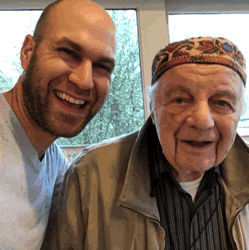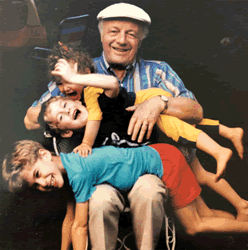A post by Boaz Munro
This is my beloved Zeyde. His name is Moshe. He's 100 today; December 10 2020 This is his story: Moshe Baran was born on December 10, 1920, in Horodok - a small Jewish shtetl in Belarus. Horodok was a market town; twice a week, the square filled with farmers, merchants, and animals. On Fridays, women cooked and cleaned in preparation for the Sabbath. Families gathered for dinner, and Saturdays were quiet as people refrained from work, prayed, and visited neighbors. Moshe was the oldest of four - he had a brother, Joshua, and twin sisters, Mina and Mussia. Their father Yosef was a trader and their mother Esther was a housewife. They lived in a small house with a dirt floor and no running water or electricity. In 1939, when Moshe was 19, World War II broke out, and the Soviets occupied Horodok. Religious life ended and people began disappearing - sent to Siberia. They were the lucky ones; in 1941, the Nazis invaded and pushed out the Russians. Moshe tried to flee on foot, hoping to get his family out later, but his appendix ruptured and he had to turn back. Mussia walked to a nearby town for anesthetics because the hospital had run out. Persecution began almost immediately. Everyone had to wear a star. Prominent Jews in the town, including Moshe’s uncle, were shot. Everyone was put in a ghetto; just a handful of houses in the corner of the town. Rumors began to spread of massacres in neighboring towns (about 1/3 of all Belorussians died in the war, including the vast majority of Jews). Moshe and Joshua were sent off to different towns as forced laborers. Then, in the summer of 1942, the Jews of Horodok were exterminated. They were forced into barns, the barns set on fire. Moshe’s parents and sisters escaped this atrocity by hiding out nearby. Eventually, the whole family ended up in Krasne, a nearby town and burgeoning ghetto filled with those temporarily spared as forced laborers. But everyone knew what was coming. Moshe decided to escape. He planned to join the partisans - fighters in the forest. He started stealing weapons the Germans had stored after capturing them from the Russians, hoping to use them to appease the partisans, who were known for executing newcomers on the spot (they took a shoot-first-ask-questions-later approach to anyone who might be a spy). One night, he snuck out of Krasne and found a group of Jews hiding in the forest. Whenever he tells the story, he always says the same thing at this point: "I’ll never forget the first morning, when I stepped out of the edge of the forest. I looked at the sky. It was like the first time I discovered there was a sky. Because from the moment the Germans came, we’d always looked down like hunted animals. I saw some birds, and wished I was a bird.” Once in the forest, Moshe contacted the partisans and worked with them to get his family (and the weapons) out of the ghetto. Mina, Josh, and their mother Esther rode out of the ghetto with a farmer who was working with the partisans and had been sent to extract them. Mussia, then 15, was sick and couldn't leave, and Yosef stayed with her. Two days after they left, the ghetto in Krasne was wiped out. German soldiers shot Mussia and Yosef, along with hundreds of others. All of the bodies were burned in a huge pyre. Mina, Josh, and Esther joined the Jews hiding in the forest, and survived for a year in makeshift underground bunkers. Moshe joined a group of Russian partisans and fought the local German forces. His group was mostly able to avoid detection and suffered few casualties. They ambushed German garrisons and blew up railroads. One of Moshe's jobs was to light signal fires so that Soviet planes knew where to drop supplies into the woods. As the Russians began advancing and the Germans retreated, though, his group became encircled. The Germans were very close - at one point, Moshe was walking along the side of a building, got to the corner, and found himself face to face with a German soldier. They were both holding rifles. They looked at each other, and then they both turned around and walked away. Moshe's group had to move away from the front line. They left their base in the forest. After walking for ten days without food or water - he remembers drinking the rainwater that collected in the ruts left by cart wheels in the muddy roads - the group turned around and fought its way through the German lines. Not everyone made it, but Zeyde did. In the summer of 1944, the Germans were pushed west and the area came under Russian control. Moshe had lost his town, his friends, his cousins, his sister, and his father, but was fortunate to still have a family. The war didn’t end there, though. Moshe was drafted into the Russian Army and marched into Germany with them. He served for 3 years. After that, the family ended up in a string of camps for displaced people in Austria. In one of those camps, Moshe met Malka, his future wife. Seven years his junior, she was an orphan. She'd survived as a slave laborer in a munitions factory, but lost her mother (gassed at Treblinka) and her father and brother (shot during forced labor in the Czestochowa Ghetto). Eventually, they heard from Moshe’s relatives in America - including the daughter of his uncle who had been shot early in the occupation. Word had gotten to them that some cousins had survived. Malka eventually went to Israel, but they both knew their story wasn’t over. Moshe’s relatives sponsored him for a visa, and he brought his family to Shreveport, LA in 1950. Their relatives, who owned a successful liquor business, set them up with jobs and housing. Soon after that, the four surviving Barans moved to New York. Then Moshe went to Israel, married Malka, and brought her to New York. He became a super for a landlord; Malka went to college and became a preschool and kindergarten teacher. They had a daughter, Bella, an artist who later moved to Israel, married, and had two daughters. Their second daughter, Avi, is my mother. She married, settled in Pittsburgh, and had four children; I'm the second. When I was 5, my Bubby and Zeyde moved from New York to Pittsburgh, just a few blocks from us. We became best friends. In 2004, I traveled to Poland with him and we sent Bubby pictures of us standing in front of her childhood home in Czestochowa. In 2007, we lost Bubby to cancer. And in 2010, my brother, our mom, and I accompanied Moshe to Belarus - to Horodok, to Krasne, to places he never thought he’d see again - and said Kaddish for his family and neighbors. We met living witnesses to the massacres that had claimed their lives. On both of these trips, there were moments of grief and mourning, but most of the time he was buoyant. I still remember him chatting animatedly with locals in languages he hadn't used in decades and scrambling over the stone wall of the totally overgrown Jewish cemetery, seeming very much younger than his 90 years. He is beloved in the community. He goes to shul every morning to pray. He sparkles with curiosity, kindness, and laughter. He's spoken hundreds of times at schools and universities to tell his story. When I moved to San Francisco, I stayed connected to him as best I could by interviewing him extensively about his life. I recorded hours of interviews, which I'm now turning into a written narrative. This year, Zeyde has been isolated. The building where he lives is locked down. His hearing and vision have dulled, which makes it even harder that he’s spending his birthday alone. Still, we're blessed to have him still with us. He’s in good spirits; tired of being cooped up, but excited to be able to hug us again. I'm so grateful to the dozens of people who sent him video messages for his birthday and to the hundreds who've shown him so much love and hospitality over the years in Shreveport, New York, and Pittsburgh - his adopted hometowns - and America, his adopted country. An extra huge thank you to Ted Goleman, his absolutely heroic caretaker and dear family friend who has been a lifeline this year. I love you, Zeyde
--Gail Samowitz wrote; Happy Birthday Moshe. I believe I spoke to him on the phone about 20 years ago. My dad also grew up in Horodok. Moshe remembered my family. My dad was old (he was born in 1911) but emigrated to NYC in 1922. Dad never shared the sad story about what happened in Horodok. My grandparents are buried in a landsmen plot in Queens NY for the now defunct Horodoker Relief Association


